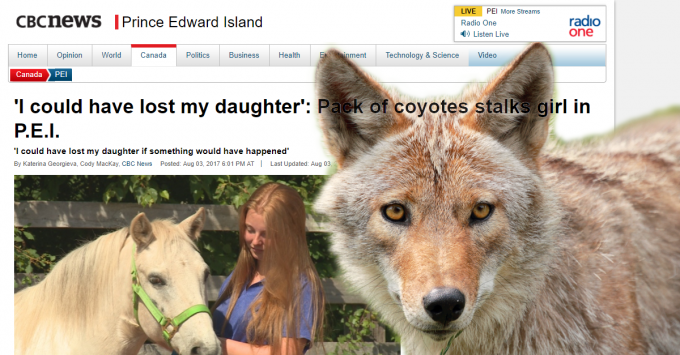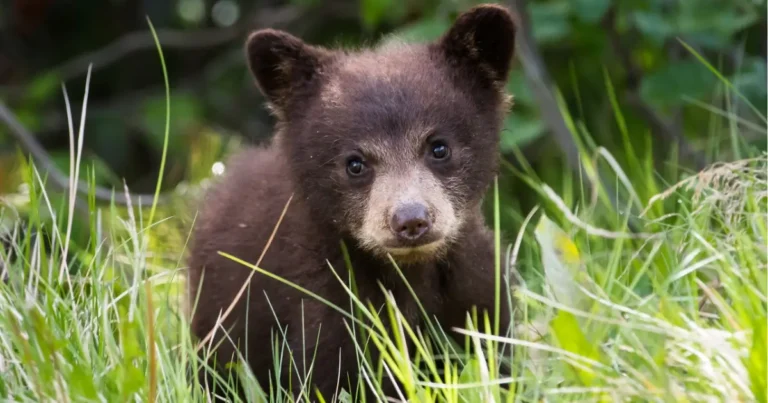
The Fur-Bearers sent a complaint to the CBC on August 8 regarding their coverage of a coyote sighting in PEI. In addition to concerns on the use of language, and a lack of additional sources to give a voice to the animals, we wrote, “It behooves the CBC to create policy within the organization in how journalists can better represent wildlife and other non-human elements in their articles, as well as recognize, and in this case publicly address, the failure to do so and the potential harm such sensationalism could bring to Canadians, and the animals with whom we share our land.”
What follows is the full text of their response:
I am writing to reply to your August 8 email addressed to CBC Ombudsman Esther Enkin raising concerns about a story which you see as CBC’s failure to meet the high journalistic standards you expect.
Since CBC journalism in the Atlantic region is my responsibility, Jennifer McGuire, General Manager and Editor in Chief of CBC News, asked me to respond to your concerns.
Let me say immediately that I regret you are disappointed in CBC. I can assure you CBC News prides itself on the excellence of its journalism. We take very seriously any assertion that our journalism is inaccurate, biased or unfair, or in any other way fails to meet our journalistic standards. I might add that where criticisms are justified, we take immediate corrective action — as we have in this case.
You wrote about an article published on our Prince Edward Island site about a teenager’s frightening encounter with a number of coyotes. That story can be found at this link: http://www.cbc.ca/news/canada/prince-edward-island/pei-mom-action-coyotes-dunstaffnage-1.4234124. You had several concerns: first, with the use of the word “stalked” to characterize the actions of the coyotes; the cutline that states that “the 17-year-old was surrounded” by coyotes; and finally, that we failed to provide adequate informed commentary about the behaviour of the animals.
Editorial leaders in Charlottetown agree with you on the use of the word "surrounded". That was both a writing and an editing failure. And it has since been corrected, because as you point out, the coyotes were described as having approached the girl – not surrounding her.
On the use of the word "stalked" – we felt this word was an appropriate description because the girl told us she saw one coyote at first and then four more appeared, at which point they came towards her and her pony, as a group, in a V-formation.
The Merriam-Webster definition of the word stalk reads: "to go through an area in search of prey or quarry". Although we do take your point that we can't be sure the animals were following the girl and her pony as quarry, the wildlife biologist with the province to whom we reached out, did suggest there was some concern that perhaps these animals had become habituated and possibly aggressive and that action could be needed.
This also addresses your point about contacting an unbiased source, such as a field biologist. As we mentioned, CBC did contact a wildlife biologist with the province, Garry Gregory, who did not suggest the family's interpretation of the encounter was incorrect. In fact he said they were taking the incident seriously, and we do quote him in the article.
"An incident where somebody feels threatened or feels like their safety is compromised by the coyotes is something we definitely take seriously," Gregory said.
Although this wasn't in the article, Gregory also said, "Certainly coyotes behaving in what can be at least perceived as aggressive behaviour certainly would put it somewhere further on the scale where action may be required."
Since the time of publication, the province has decided that there is enough concern to warrant trapping in the area.
Overall, however, your point is well taken. There are many points of view on the relative danger of wildlife, such as coyotes, and we need to explore several perspectives, especially those which can be viewed as unbiased. Gregory also told us, and we've also quoted him in the past as saying the vast majority of coyote encounters are in no way dangerous. We have updated the article to add that information.
Thank you again for your email. I hope this reply has reassured you about the continuing integrity of our news operation.
It is my responsibility to tell you that if you are not satisfied with this response, you may wish to submit the matter for review by the CBC Ombudsman. The Office of the Ombudsman, an independent and impartial body reporting directly to the President, is responsible for evaluating program compliance with the CBC's journalistic policies.
The Ombudsman may be reached by mail at Box 500, Terminal A, Toronto, Ontario M5W 1E6, or by fax at (416) 205-2825, or by email at ombudsman@cbc.ca.
Sincerely,
Nancy Waugh
Managing Editor, CBC Atlantic
Our final response:
“You state that the province has deemed there is enough concern to issue a trapping permit. We think if you take a look at the number of coyotes killed per year in Nova Scotia via trapping, and examine the language used by both the DNR and trappers, you will recognize that this isn’t about concern, but that the province sees no issue in killing coyotes in this region as the population can sustain it. This is the alternative perspective the CBC needs to consider: that there are people who benefit from the exploitation, or potentially inappropriate fear, of these animals – and that the CBC, by not pushing hard on this, repeating opinion as fact, or looking for more sources, is giving these people exactly what they want.
monthly donor(for as little as $10/month – the cost of two lattes) pleaseclick hereand help us save lives today.

